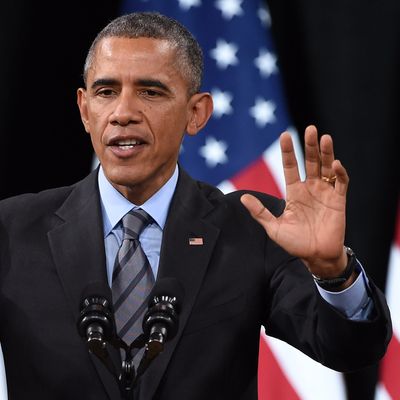
President Obama’s remarks last night on the grand jury decision in Ferguson, Missouri, will not be recorded by history as a stirring piece of rhetoric. But in a small way, it managed to capture the narratives swirling around the tragic events. And it encapsulated the eternal dilemma of the liberal, carefully balancing ideological pressure, which is always more acute in furious times.
The competing realities Obama was attempting to balance include the following:
- There is a wide-scale, if not universal, problem with racially biased policing. Those problems can and must be addressed politically.
- While Ferguson has a demonstrable record of racially biased policing, the shooting of Michael Brown may or may not be a case of this in action. (Obama elided any factual judgment of the Brown case, the specifics of which are murky.)
- Violent rioting, as opposed to peaceful protest, is both wrong and counterproductive.
I find all those points compelling. Many liberals expressed dismay at the president’s equivocation (These tweets were curated by Ezra Klein):
One can find a parallel dynamic on the right, which has been unable or unwilling to face up to the systemic racial biases at work around St. Louis. Conservative columnist Dennis Prager makes an incredibly revealing admission about the right’s inability to handle intellectual complexity. Prager’s column about Ferguson endlessly repeats the phrase “moral truth,” flaying liberals for their inability to grasp it. “For every black and every white unwilling to condemn the protests over Michael Brown’s killing that took place before any relevant facts came out — their halfhearted condemnation of the riots notwithstanding — truth doesn’t matter,” writes Prager, “The protests, riots and liberal condemnations of the white officer began when no one knew anything about the killing.”
But, of course, while black residents of Ferguson lack perfect knowledge of how Brown’s killing unfolded, they have deep experience with years of brutal racism at the hands of the authorities. (If you haven’t read Radley Balko’s masterful, infuriating deep-dive overview, please do so.) The very idea of moral complexity is the literal target of Prager’s anger.
It is also true that some elements of the left have had difficulty facing up to the problem caused by rioting. They have either implicitly justified violence …
… or taken any condemnation of violence as an expression of satisfaction with conditions in Ferguson:
Property damage and looting impede social progress. They do so in their proximate impact (destroying the town and livelihoods of residents of Ferguson) and in their long-term impact of fostering a backlash. There is no contradiction in opposing a response to injustice that creates more injustice. It is not coincidental that protests were peaceful in every major city but Ferguson, on which every self-styled revolutionary in the United States descended.
Obama’s speech was filled with on-the-one-hand, on-the-other passages like this:
Those of you who are watching tonight understand that there’s never an excuse for violence, particularly when there are a lot of people in goodwill out there who are willing to work on these issues.
On the other hand, those who are only interested in focusing on the violence and just want the problem to go away need to recognize that we do have work to do here, and we shouldn’t try to paper it over.
Franklin Foer has a splendid essay commemorating The New Republic’s role in crafting American liberalism. Foer acknowledges the qualities of complexity and internal contradiction that make liberalism such an inviting target, quoting this old satirical Phil Ochs song:
I go to civil rights rallies
And I put down the old D.A.R.
I love Harry and Sidney and Sammy
I hope every colored boy becomes a star
But don’t talk about revolution
That’s going a little bit too far
So love me, love me, love me, I’m a liberal…
If Obama can sound unsatisfyingly out of touch in moments of intense passion, that is because that is the undying quality of the philosophical tradition to which he is heir.






























